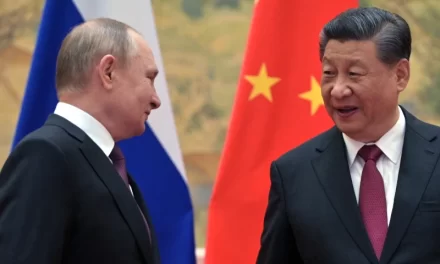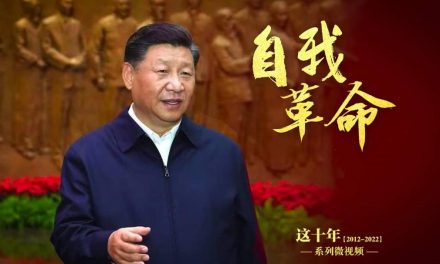BY BRADLEY A. THAYER AND LIANCHAO HAN
Chinese leader Xi Jinping recently held a study session with Chinese Communist Party (CCP) members, in which he instructed them to bolster the party’s capability in global communication to better tell China’s story. Some in the West have misinterpreted this, as Politico reported in “Xi defangs the ‘Wolf Warrior’,” but we believe Xi is waging a new and greater round of ideological war against the free world.
Xi is unhappy about the effectiveness so far of his external propaganda apparatus, which cost China billions of dollars to construct. Detrimental views of China are at all-time highs in many Western countries because of the COVID-19 virus. But, rather than seeing this as a reflection of CCP policies, Xi contends that negative views of China are a result of his propaganda machine not telling China’s story well. He wants China’s power in international discourse to match its current composite strength and rising status. In other words, if China is almost as powerful as the United States, it must have the same commanding voice as the U.S.
For Xi, China needs greater power in international discourse to create a favorable view for its development and stability, and to build a “community with a shared future for mankind.” In actuality, this means the CCP must control the global narrative to ensure the communist regime’s security and expand its reach. Specifically, according to a translation of Xi’s speech by Adam Ni, co-founder of the China Neican newsletter, Xi wants to “help foreign people realize that the CCP really strives for the happiness of the Chinese people and understand why the CCP can govern, why Marxism works and why socialism with Chinese characteristics is great.” In other words, the “China story” is the “Chinese Communist Party story,” requiring heavy spin.
To achieve this, Xi wants China to build a strategic communication system with distinctive Chinese characteristics and to improve the appeal of Chinese culture, the likability of China’s image, and the persuasiveness of China’s discourse to guide world public opinion.
In our view, Xi has realized China’s “wolf warrior diplomacy” backfired. Even though he started and encouraged the narrative, he now holds that China must create a “likable and friendly” apparatus to make its misinformation more believable and assist the coverup of China’s crimes against humanity. Instead of defanging his warrior wolves, Xi will ask them to put on sheep’s clothing to artfully control the spin of China’s story. The party’s must extensively spread communist ideology and the dictatorial model of governance, and convince the rest of the world to believe the so-called “Chinese solutions.”
Xi has ordered party chiefs to take more initiative to carry out this task. Party schools must make international propaganda capacity-building an important part of their curriculum, and universities must provide necessary researchers and talent for this modern-day political warfare. The CCP has no interest in engaging in meaningful dialogue with the United States; instead, it seeks to offer a discourse system to replace or minimize America’s soft power.
This ideological war will have a multifaceted impact. China will roll out more international exchange programs and international conferences. It will heighten the use of Chinese cultural programs — music, the arts, Mandarin language instruction — to get across its propaganda and engage people in target countries. This has happened before, such as when the Philadelphia Orchestra fell into a financial crisis in 2011 and China offered a cooperation agreement with its National Centre for the Performing Arts, making it a willing component of China’s propaganda system. Similarly, Ohio’s Oberlin Orchestra has played “Ode to the Red Flag” in praise of China’s “great achievements.” We expect China to put money into other Western arts and cultural organizations.
Similarly, China will increase its investment in Western media organizations, using their platforms and reporters to spread content that appears plausible on the surface. We expect China to offer Western journalists contracts to weave them into China’s expanding army of global public opinion influencers who are sympathetic to the CCP.
The essence of Xi’s ideological war is to beautify the communist regime’s image, which requires misleading and suppressing the truth about China’s human rights atrocities. The goal is to win the hearts and minds of people around the globe. It is, perhaps, destined to fail, but the latest game of China’s propaganda “warrior wolves in sheep’s clothing” is dangerous and the world must be vigilant.
This article first appeared in The Hill on 06/14/21 4:00 PM ET




















